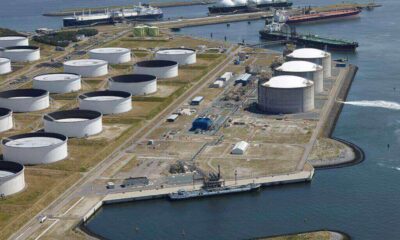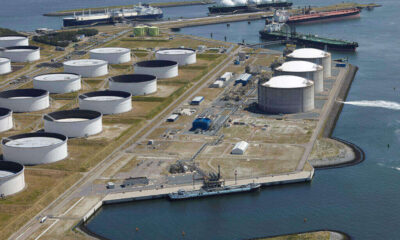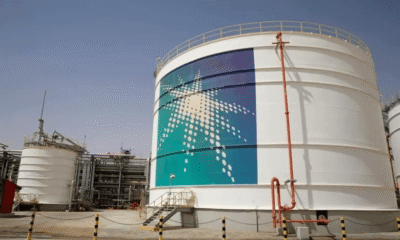The International Monetary Fund (IMF), on April 24, urged Nigeria and other African countries to bolster their fundamentals to withstand global shocks amid the US-China trade tensions.
The IMF Managing Director, Kristalina Georgieva, noted that oil producers like Nigeria must strengthen their fiscal positions amid heightened global uncertainty and declining oil prices.
The IMF Chief made the call in her Managing Director’s Global Policy Agenda at the 2025 Spring Meetings of the IMF and World Bank Washington.
Nigeria’s Shocks Amid US-China Trade Tensions
Speaking primarily of Nigeria’s budgetary situation amid tariff tensions, low oil prices, and global uncertainty, the IMF stated that Nigeria faces a peculiar problem separate from other economies.
The IMF stated, “For oil producers like Nigeria, falling oil prices create additional pressure on their budgets. On the other hand, for the oil importers, this is a breath of fresh air.”
Oil prices have plunged amid global uncertainty and the OPEC+ decision to increase output. Brent crude has been hovering around $66 a barrel since President Trump imposed reciprocal tariffs on April 2.
With Nigeria’s 2025 budget pegged at a crude oil benchmark of $75 per barrel, there are concerns that low crude oil prices could erode Nigeria’s revenue from commodity exports.
At the Spring Meetings, Jason Wu, Assistant Director of the IMF’s Monetary and Capital Markets Department, stated thus: “If trade tensions are going to lead to lower global demand for commodities, this will obviously weigh on the revenue that they will receive.”
Therefore, the IMF Fund cautioned the federal government that Nigeria’s earnings from commodity exports could decline significantly if global oil demand weakens.
IMF Recommendations for Nigeria
Amid deteriorating US-China trade tensions and global economic uncertainties, the IMF mentioned some strategic measures Nigeria can adopt to absorb global shocks.
The IMF recommended that Nigeria strengthen its fiscal base, which would boost the federal government’s non-oil revenue generation.
Abebe Aemro Selassie, IMF Africa Director, highlighted that Sub-Saharan African countries should focus on enhancing tax systems and broadening the tax base to sustainably finance development needs.
Nigeria’s tax-to-GDP ratio is among the lowest in the world. It is estimated at around 6–7%, compared to the global average of 15–20%.
As such, the IMF wants Nigeria to embark on tax reforms to diversify its revenue sources. This would enable the government to fund infrastructure, healthcare, and education without excessive borrowing. Another measure Nigeria can take, according to the IMF, is to reduce its dependency on oil revenues.
Oil and gas exports have historically fueled Nigeria’s economy. Oil exports account for 80% of Nigeria’s revenues, 50% of government revenues, and the bulk of its foreign reserves. The country’s oil and gas reserves have hit a record high of 37.28 billion barrels and 210.5 trillion cubic feet.
Unfortunately, as a Petrostate, Nigeria’s economy is vulnerable to shocks such as global shifts towards renewable energy and geopolitical tensions. As such, the IMF recommended that Nigeria allocate some portions of its oil revenues to a sovereign wealth fund. This would enable Nigeria to invest strategically in manufacturing, technology, health, and others, laying a diversified foundation for future growth.
Furthermore, the IMF advised Nigeria to reduce their overdependence on any single global partner, notably China.
China is the largest trading partner for most sub-Saharan African countries, including Nigeria. According to the IMF, Nigeria’s deep ties to China means it is vulnerable to:
- Debt vulnerabilities: China funds several infrastructure projects in Nigeria through loans, often under opaque terms, raising fears of debt trap.
- Trade imbalances: In 2024, China’s exports to Nigeria totalled ₦14.15 trillion. China’s imports from Nigeria ₦2.99 trillion. Thus, Nigeria imports far more from China than it exports, creating persistent trade deficits.
- Supply chain risks: Nigeria is overreliant on Chinese goods. As a result, it is vulnerable to supply chain disruptions during global crises like the COVID-19 pandemic. The supply chain bottlenecks caused by the pandemic exposed Nigeria’s inability to access medical equipment from China.
Thus, the IMF recommends that Nigeria boost with fellow African countries through the African Continental Free Trade Area (AfCFTA). With the AfCFTA, Nigeria can boost trade ties with Ghana, South Africa, Egypt, Kenya, and Morocco.
Beyond Africa, Nigeria can strengthen trade ties with emerging markets in Asia, Latin America, and the Middle East. Key targets include India, Brazil, the Gulf states, and Turkey.
The IMF also suggested that African countries, including Nigeria, reengage with Western countries, particularly the European Union, the UK, and the United States, for comprehensive trade deals.




























Pingback: Nigeria to Review Its Trade Strategies Amid US Tariff Threat - Nigeria Oil Digest